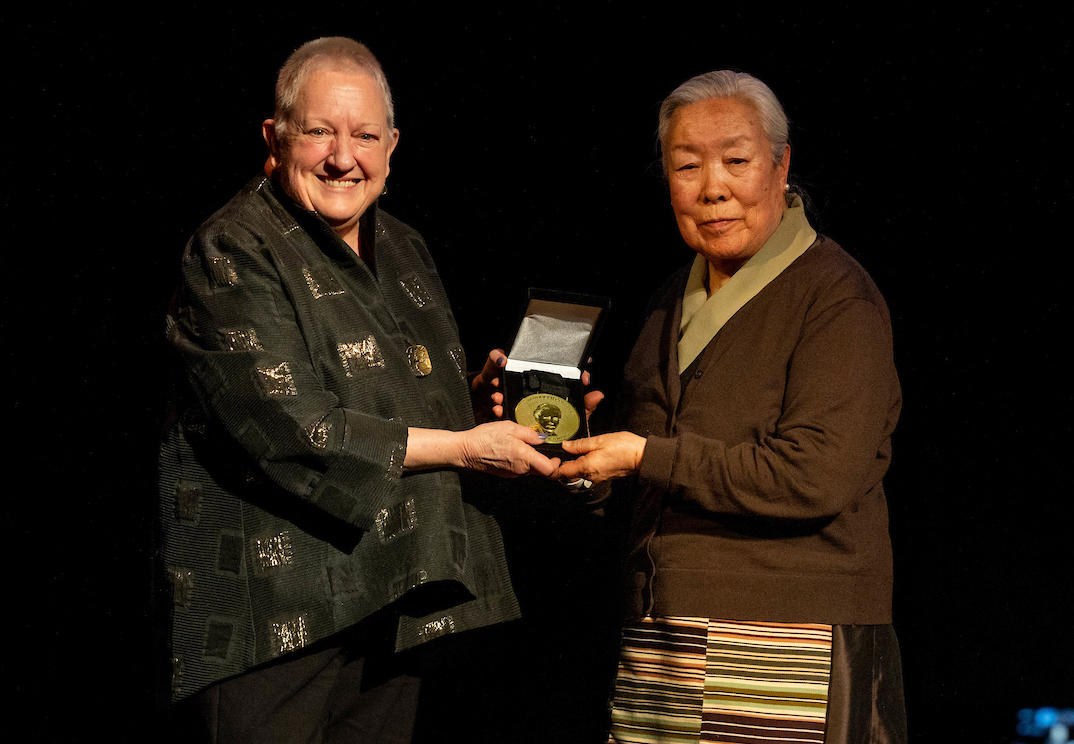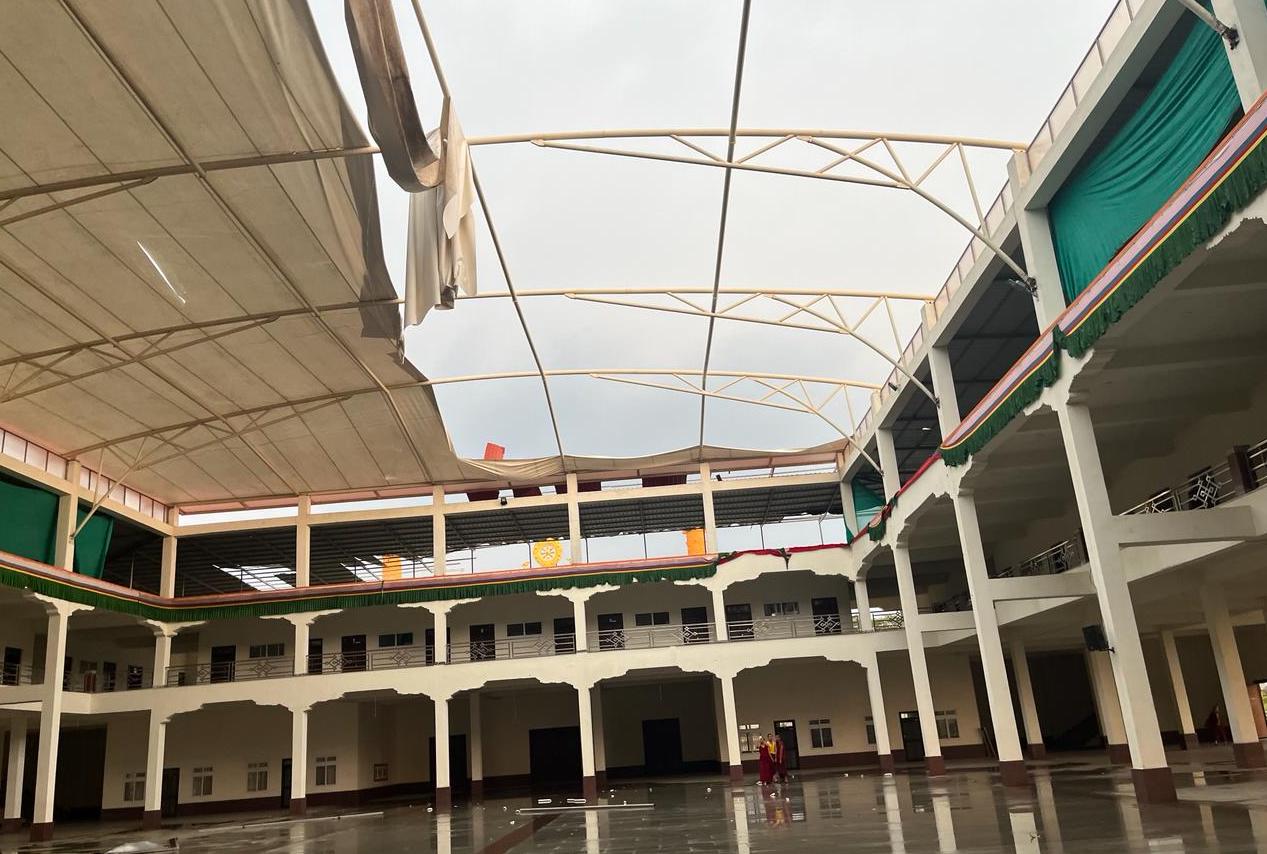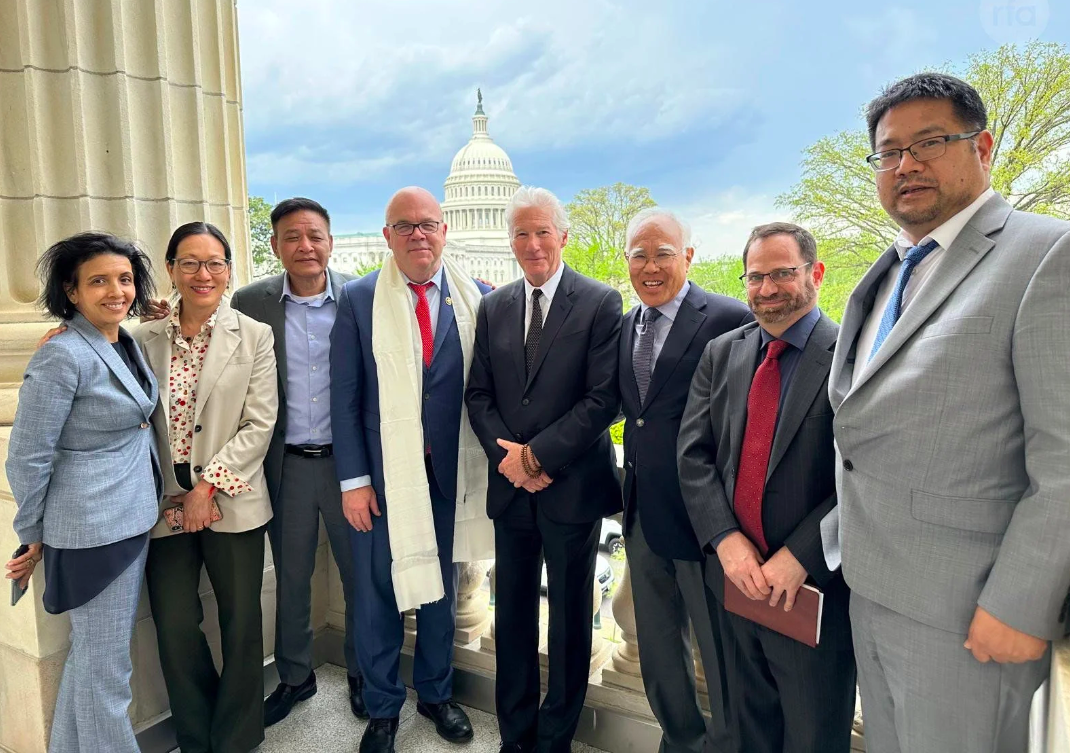 A fund raising cultural evening was held in Sydney, Australia on 27 January 2007 to fund raise for the magazine “Gyang Bod”, which means “Crying from a Distance” and its new English version, “Tibetan Voice”. The magazine is published by the Gyang-bod committee and is supported by the Tibetan Community Association, the Australian Tibet Council and the Australian Tibetan Society. The executive, Lobsang Lungtok, introduced the magazine. A full copy of his speech is included at the end of this article.
A fund raising cultural evening was held in Sydney, Australia on 27 January 2007 to fund raise for the magazine “Gyang Bod”, which means “Crying from a Distance” and its new English version, “Tibetan Voice”. The magazine is published by the Gyang-bod committee and is supported by the Tibetan Community Association, the Australian Tibet Council and the Australian Tibetan Society. The executive, Lobsang Lungtok, introduced the magazine. A full copy of his speech is included at the end of this article.
The aim of this publication is to focus on the survival of Tibetan cultural identity and to preserve and promote the Tibetan written language. It will provide an opportunity for overseas Tibetans to read international and national issues in their own language and act as a forum for community discussion.
Fund raising activities will be organised to support the publishing of this extremely important publication.
 Last night, 27 January 2007 was the first such fundraising event at the Dee Why Community Centre in Sydney. The Gyang-bod team hosted a wonderful evening of entertainment and information on the Tibetan issue. It was an evening of music, food, guest speakers, finishing with a screening of the documentary “Voices in Exile”.
Last night, 27 January 2007 was the first such fundraising event at the Dee Why Community Centre in Sydney. The Gyang-bod team hosted a wonderful evening of entertainment and information on the Tibetan issue. It was an evening of music, food, guest speakers, finishing with a screening of the documentary “Voices in Exile”.
The Tibetan cultural events are proving to be a very popular item on the Sydney calendar, as they are thoroughly enjoyed by participants and guests alike. A social network is built between the general local Australian community and the rapidly expanding Tibetan sector of the community. Attending guests feel they have been transported to Tibet for a night to experience the culture, warmth and pain of an occupied nation, leaving at the end with information about the current situation in Tibet and what they can do to support the plight.
The more well educated the world becomes on the events that are taking place in Tibet, the more opportunity to exert pressure on China to rationalise its policy into a more humane and morally sound regime. Brute force, violence, ignorance and arrogance are not what any world power would aspire to. Any truly great nation needs to show its greatness by demonstrating wisdom and leadership regarding global responsibility. As the Chinese regime acknowledges that the world is seeing a clearer picture of their lack of care for those under its rule, it could hopefully prompt a long overdue review of policy regarding humane treatment of its citizens, with particular attention to the treatment and protection of the unique Tibetan culture.
This is the hope of His Holiness the Dalai Lama. If world awareness is sufficient to promote discussions between His Holiness and the Chinese Government, perhaps the end of the suffering of the Tibetans still inside Tibet will be alleviated more quickly. The global uprising of supporters for His Holiness and his relentless belief in resolution without violence is a good sign that there is hope for humanity, and that the notion of acceptance of bullying dictatorships is being challenged on a personal level by many of us.
These cultural evenings are an extremely efficient method of communicating this message to those who may not be fully aware of the situation, as press coverage in the usual media is almost non-existent.
This magazine should ensure that at least the Tibetan community itself is informed of developments and world news, and then maybe the information can be passed across to the general public using both the English version of the magazine and many more cultural evenings as the vehicles.
The program last night was:
Auspicious Dance by the Tibetan dancers
Introduction and presentation of the Tibetan Voice magazine by executive editor Lobsang Lungtok Amdo.
Guest speaker, Justice John Dowd
Dancing and music by Tibetan children and Tibetan musicians.
Guest speaker, Val Grogan, Australia Tibet Society
Guest speaker, Paul Bourke, Australia Tibet Council
Tibetan dinner
Guest speaker, Jigme Dorje, President of the Tibetan Community in Australia
Screening of documentary “Voices in Exile”
An information table was open all evening to the rear of the hall, where editions of the new magazine and relevant information was available for all attendees.
Some very pertinent points were raised by the guest speakers. One of which was that in the past, many Tibetan aid activities have been initiated through the various Tibetan support and friendship organizations. It was commented that the Tibetan community in Australia has now come of age and is now stable enough and strong enough to promote its own activities, either in liaison with, or independent of their support organizations. This is an unprecedented development, as until now the community was so small, it was reliant on external assistance. As is demonstrated by this new publication, Tibetans are now strong enough to walk independently, as well as with friends, in the struggle to raise awareness. This gives a better sense of identity and structure to the community itself.
A second point was that one of Australia’s darkest moments in the past was the mistake it made with the Aboriginal community, of trying to make all Australian community uniform and to ignore and destroy their individual wisdom and culture. Australia has since realized its mistake and acknowledged that the Aboriginal community has a great deal to teach the world, especially in regard to care and respect for our environment.
Australia now has the same opportunity with the Tibetan community. This time we can welcome the diversity and incredible depth of knowledge within this culture and feel privileged to learn from it. Once this relationship is well established, the desire to protect the culture within Tibet itself will be natural, and hopefully it will not be too far away when Tibetans and their culture are respected and protected within Tibet itself.
The evening was well attended, was an outstanding success, and I am sure that the Tibetan Voice magazine will be equally well supported and successful. I wish all the best to everyone involved with this very important venture.
Copy of Introductory Address by Lobsang Lungtok
Hello. My name is Lobsang Lungtok and I’d like to thank you all for coming to this event. We especially welcome our special guests, Justice John Dowd, and the presidents of the Tibetan Community Association, the Australian Tibet Council, the Australian Tibetan Society and the Tibetan Friendship Group.
Gyang Bod means crying from a distance. Tibetans in exile are unable to return to live in our own country Tibet, so we must retain our culture. Our aim is to preserve and promote the Tibetan language, as the essence of our religion, politics, culture and traditions is in our language.
Gyang Bod will give an opportunity for Australian Tibetans to read international and national issues in their own language and will also help to preserve and promote the Tibetan language within the Tibetan exile community in Australia. This news magazine is a forum for Tibetans in Australia to express and discuss their views and ideas about all aspects of life as a Tibetan living in exile, and gives encouragement to Tibetan children with their Tibetan language. It is also distributed to overseas Tibetans.
So many Tibetans now live in different countries and communities around the world, and settling in a new country can make them lose the skills of their language. We have put effort in bringing out this newsmagazine to keep alive this skill, and to promote a love of our own language. It will also contribute to our multicultural society.
A small group of Tibetans from the Northern Beaches in Sydney met on the 10th March 2006 and decided to bring out Gyang-bod – in memory of the tens of thousands of Tibetans who were killed during the Tibetan National Uprising in 1959, against the illegal and forceful occupation of Tibet by the Communist Chinese forces.
We are a committee who are all working together to produce Gyang-bod. It is through the time and energy of each one of us that Gyang-bod can be a success.
We wish to publish four editions each year although it will require time and funds. This is not for any personal gain or fame, but is for those who wish to know and read about Tibet, its culture, traditions and beliefs. We started with initial funding from members of the editorial committee, but our readership base is still growing, so we cannot continue to cover all our expenses. This means we need to rely on the support of generous individuals and organizations if this project is to continue. We request, therefore, your support and assistance.
The Tibetan community has always supported the aims of Gyang Bod and we value their continued support. We also wish to acknowledge and thank the Australian Tibet Council for their support and encouragement from the beginning, and particularly for their generous financial help.
We now plan to publish an English edition of Gyang Bod under its English name of Tibetan Voice. This will help Australians and other English speakers to hear our voice, and they will be able to learn more about our culture and ideas. We will start with one edition a year, which will include the first four editions, and then we hope to have editions which complement the Tibetan Gyang Bod. Some of you may like to help us with this.
I will tell you why I want to publish Gyang Bod. This comes from my own experience. I was a monk and spent eighteen months in jail for writing a poem. My life was made difficult by the Chinese police after I was released, and eventually I had to leave Tibet because I had information that I would be arrested again. I escaped over the Himalayas to Dharamsala and have now come to Australia where I am an Australian citizen.
Gyang Bod is for Tibetans and for Tibetan supporters. We have two tasks; to promote our culture and tell our story, and to tell the world, about our experience.
I will now read you a poem…
Although there is an insatiable desire to write poems
Whenever I see the ocean,
Nothing comes into my mind,
Except a huge, empty, Dark Blue Sea.
My heart is floating on the crest of waves
The more I look at the sea
The more I want to cry
Gyang-Bod means crying from a distance
We are crying,
Because
We saw the ash from all our precious cultural studies.
We saw the warm blood of massacres
We saw the waste of nuclear weapons
but we are
Crying for freedom
Crying for justice
Crying for peace
Crying for help
gyang-bod means a new life to me.
gyang-bod means new steps to me.
Gyang-bod means crying from a distance









